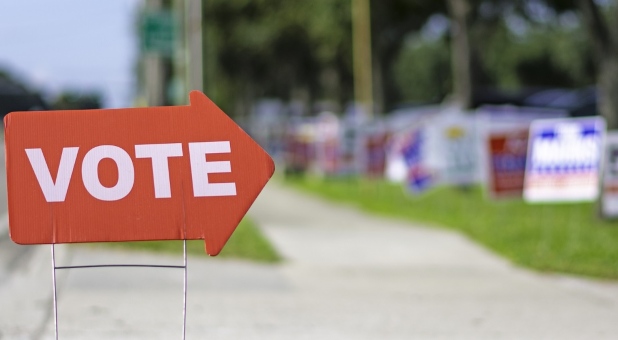Christian Voting Myth No. 2: ‘God Is in Charge Anyway So It Doesn’t Matter if I Vote’
Editor’s Note: This is part two of a four-part series debunking common myths Christians use to not vote. The remaining two segments will each run this week at 3 p.m.
Anyone who has spent 15 minutes around a church during election season has heard someone say some version of the following: “Don’t worry about the election. It doesn’t really matter what happens because God is always in charge anyways.”
It’s true, of course, that God is always in charge. Neither human frailty nor human stupidity threaten God’s plan for the world. He will accomplish His plan despite us. But it isn’t logical to conclude that because God is sovereign, we don’t have to care about what happens in government. Here’s why.
The freedom we enjoy in America is unusual. Even if you’re not a political activist, you’re probably thankful that life in the United States is different than life in places like Venezuela or North Korea. It’s not just different—it’s better. We can own property, say stupid things online about our government without fear of the police arresting us for it and even help determine who our government is.
These freedoms are so normal for Americans that we tend to take them for granted, but they were unimaginable for generations past. Billions of people have lived and died under a monarchy, oligarchy or some form of dictatorship. That’s not only true of the past, it’s true of the present. Most people alive in the world right now are not free in the way Americans understand freedom.
Those of us who have freedom and prosperity probably didn’t do anything to earn it. We inherited it. We’re political trust fund babies. Though we didn’t do anything to get it, we are responsible for what we do with it. To whom much is given, much is required. That’s why indifference isn’t an option. The American form of government is a gift, and we owe it to those who gave us that gift to treat it with appropriate respect and appreciation. One way we do that is by taking care of it.
A republican form of government, like everything in our lives, requires constant maintenance. If you decide to never mow your lawn again, never replace the breaks on your car or never fix the leak in your roof, God will still be in charge and He will still accomplish His purpose. Nothing about neglecting adult responsibilities threatens God’s sovereignty. But we don’t decline to fix our roof because God is sovereign, nor is God’s sovereignty the reason we would fix it. We fix the roof as an act of stewardship for the good gift of a house that God has given us and as an act of service to the people in our family who live in the house. So it is with governments.
Educating ourselves, voting and running for office are forms of civic maintenance. They feel like chores because in a real sense, they are chores. They’re civic chores and they’re a privilege. We shouldn’t complain about our civic duties any more than we should complain about the maintenance costs on our private fleet of jets. Some problems aren’t problems, they’re blessings. It is a privilege to be able to query which candidate is most tolerable. At least we get to have an opinion. Doing the work necessary to keep the luxury items God has given us in good condition does not show a lack of trust in God’s sovereignty, it shows good stewardship of what He has given to us and kindness to our neighbors.
After all, well-maintained governments make life better for everyone. Ideas are not neutral. All ideas have consequences, and bad ideas have victims. When we allow bad ideas to take root in government, people get hurt.
Engagement in our government is not just a way to fulfill a civic duty, it’s a chance to make life tangibly better for other people: Babies who would otherwise die get to live. People who would otherwise be punished for speaking the truth get to speak. Businesses that would otherwise be shut down can flourish. Parents who would otherwise lose the right to direct the upbringing of their children get to have the final say. Communities that would otherwise be unsafe are able to thrive. Justice exists where it didn’t before. Some political choices are purely a matter of opinion—chocolate or vanilla? But sometimes they’re a matter of life and death.
It’s true that God is in charge and we can trust Him, even when things are hard. It is also comforting to know that God will restore all things in His time, even if something bad happens. But that’s no excuse for indifference. God has placed us on earth to be His hands and feet in a broken world. Our efforts to make the world better by living out our beliefs are not a sign of misplaced trust but a recognition of who He made us to be. {eoa}
Joseph Backholm is senior fellow for biblical worldview and strategic engagement for the Family Research Council.














































